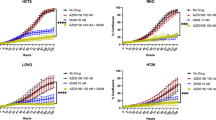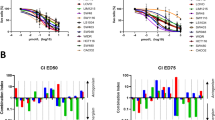Abstract
Background
VE-822 is a novel inhibitor of ATR, a key kinase involved in the DNA damage response pathway. The role of ATR inhibition in reversing drug resistance in various cancer types has been investigated. Therefore, this study investigated the effects of ATR inhibition by VE-822 on reversing 5-fluorouracil (5-FU) resistance in colorectal cancer cell line (Caco-2).
Methods
Caco-2 and 5-FU resistance Caco-2 (Caco-2/5-FU) cells were treated with 5-FU and VE-822, alone and in combination. Cell proliferation and viability were assessed by MTT assay and Trypan Blue staining. P-glycoprotein (P-gp) and multidrug resistance-associated protein 1 (MRP1) activities were measured by Rhodamine123 accumulation and uptake assay. The mRNA levels of P-gp, MRP-1, ataxia telangiectasia and Rad3-related (ATR) and checkpoint kinase 1 (CHK1) were measured by qRT-PCR. Western blot was used to measure the protein levels of P-gp, MRP-1, γ-H2AX, ATR and CHK1 in cells. 8-Oxo-2’-deoxyguanosine (8-oxo-dG) levels were determined via ELISA. Apoptosis was evaluated by ELISA death assay, DAPI staining and lactate dehydrogenase (LDH) assay.
Results
The Caco-2/5-FU cells showed lower levels of 5-FU mediated proliferation inhibition in comparison to Caco-2 cells. VE-822 decreased the IC50 value of 5-FU on resistant cells. In addition, the expression levels and activity of P-gp and MRP-1 were significantly decreased in resistant cells treated with VE-822 (P < 0.05). The combination of 5-FU and VE-822 increased apoptosis in Caco-2/5-FU cells by downregulating CHK1 and ATR and upregulating γ-H2AX and 8-oxo-dG.
Conclusion
The simultaneous treatment of resistant colorectal cancer cells with 5-FU and ATR inhibitor, VE-822, was demonstrated to be effective in reversing drug resistance and potentiating 5-FU mediated anticancer effects via targeting DNA damage.








Similar content being viewed by others
Data availability
Data will be available upon requesting from corresponding author.
References
Siegel RL, Wagle NS, Cercek A, Smith RA, Jemal A (2023) Colorectal cancer statistics, 2023. Cancer J Clin 73(3):233–254
Kanth P, Inadomi JM (2021) Screening and prevention of colorectal cancer. BMJ. 374
Alzahrani SM, Al Doghaither HA, Al–Ghafari AB, Pushparaj PN (2023) 5–Fluorouracil and capecitabine therapies for the treatment of colorectal cancer. Oncol Rep 50(4):1–16
Sethy C, Kundu CN (2021) 5-Fluorouracil (5-FU) resistance and the new strategy to enhance the sensitivity against cancer: implication of DNA repair inhibition. Biomed Pharmacother 137:111285
Gmeiner WH, Okechukwu CC (2023) Review of 5-FU resistance mechanisms in colorectal cancer: clinical significance of attenuated on-target effects. Cancer Drug Resist 6(2):257
Shekh R, Ahmad A, Tiwari RK, Saeed M, Shukla R, Al-Thubiani WS et al (2023) High therapeutic efficacy of 5‐Fluorouracil‐loaded exosomes against colon cancer cells. Chem Biol Drug Des 101(4):962–976
Hansen E, Read AF (2020) Cancer therapy: attempt cure or manage drug resistance? Evol Appl 13(7):1660–1672
Van der Jeught K, Xu H-C, Li Y-J, Lu X-B, Ji G (2018) Drug resistance and new therapies in colorectal cancer. World J Gastroenterol 24(34):3834
Majidinia M, Alizadeh E, Yousefi B, Akbarzadeh M, Mihanfar A, Rahmati-Yamchi M, Zarghami N (2017) Co-inhibition of notch and nf-κb signaling pathway decreases proliferation through downregulating iκb-α and hes-1 expression in human ovarian cancer OVCAR-3 cells. Drug Res 67(01):13–19
Blondy S, David V, Verdier M, Mathonnet M, Perraud A, Christou N (2020) 5-Fluorouracil resistance mechanisms in colorectal cancer: from classical pathways to promising processes. Cancer Sci 111(9):3142–3154
Majidinia M, Alizadeh E, Yousefi B, Akbarzadeh M, Zarghami N (2016) Downregulation of notch signaling pathway as an effective chemosensitizer for cancer treatment. Drug Res. :571–579
Srinivas US, Tan BW, Vellayappan BA, Jeyasekharan AD (2019) ROS and the DNA damage response in cancer. Redox Biol 25:101084
Mirza-Aghazadeh-Attari M, Ostadian C, Saei AA, Mihanfar A, Darband SG, Sadighparvar S et al (2019) DNA damage response and repair in ovarian cancer: potential targets for therapeutic strategies. DNA Repair 80:59–84
Lans H, Hoeijmakers JH, Vermeulen W, Marteijn JA (2019) The DNA damage response to transcription stress. Nat Rev Mol Cell Biol 20(12):766–784
Burger K, Ketley RF, Gullerova M (2019) Beyond the trinity of ATM, ATR, and DNA-PK: multiple kinases shape the DNA damage response in concert with RNA metabolism. Front Mol Biosci 6:61
Biswas H, Makinwa Y, Zou Y (2023) Novel Cellular functions of ATR for therapeutic targeting: embryogenesis to Tumorigenesis. Int J Mol Sci 24(14):11684
Groelly FJ, Fawkes M, Dagg RA, Blackford AN, Tarsounas M (2023) Targeting DNA damage response pathways in cancer. Nat Rev Cancer 23(2):78–94
Sun L-L, Yang R-Y, Li C-W, Chen M-K, Shao B, Hsu J-M et al (2018) Inhibition of ATR downregulates PD-L1 and sensitizes tumor cells to T cell-mediated killing. Am J cancer Res 8(7):1307
Gill MR, Vallis KA (2019) Transition metal compounds as cancer radiosensitizers. Chem Soc Rev 48(2):540–557
Yin Q, Liu X, Hu L, Song Q, Liu S, Huang Q et al (2021) VE-822, a novel DNA holliday junction stabilizer, inhibits homologous recombination repair and triggers DNA damage response in osteogenic sarcomas. Biochem Pharmacol 193:114767
Fokas E, Prevo R, Pollard J, Reaper P, Charlton P, Cornelissen B et al (2012) Targeting ATR in vivo using the novel inhibitor VE-822 results in selective sensitization of pancreatic tumors to radiation. Cell Death Dis 3(12):e441–e
Schmitt A, Knittel G, Welcker D, Yang T-P, George J, Nowak M et al (2017) ATM Deficiency is Associated with sensitivity to PARP1-and ATR inhibitors in lung AdenocarcinomaTargeting DNA repair–deficient lung adenocarcinomas. Cancer Res 77(11):3040–3056
Liang X, Yang Q, Wang W, Liu T, Hu J (2019) VE-822 mediated inhibition of ATR signaling sensitizes chondrosarcoma to cisplatin via reversion of the DNA damage response. OncoTargets Therapy 12:6083
Shi Q, Shen L-Y, Dong B, Fu H, Kang X-Z, Yang Y-B et al (2018) The identification of the ATR inhibitor VE-822 as a therapeutic strategy for enhancing cisplatin chemosensitivity in esophageal squamous cell carcinoma. Cancer Lett 432:56–68
Holohan C, Van Schaeybroeck S, Longley DB, Johnston PG (2013) Cancer drug resistance: an evolving paradigm. Nat Rev Cancer 13(10):714–726
Yousefi B, Zarghami N, Samadi N, Majidinia M (2016) Peroxisome proliferator-activated receptors and their ligands in cancer drug-resistance: opportunity or challenge. Anti-cancer agents in Medicinal Chemistry (formerly current Medicinal Chemistry-Anti-cancer agents). 16(12):1541–1548
Yousefi B, Samadi N, Baradaran B, Rameshknia V, Shafiei-Irannejad V, Majidinia M et al (2015) Differential effects of peroxisome proliferator-activated receptor agonists on doxorubicin-resistant human myelogenous leukemia (K562/DOX) cells. Cell Mol Biol 61(8):118–122
Duan C, Yu M, Xu J, Li B-Y, Zhao Y, Kankala RK (2023) Overcoming Cancer Multi-drug Resistance (MDR): reasons, mechanisms, nanotherapeutic solutions, and challenges. Biomed Pharmacother 162:114643
Al Bitar S, El-Sabban M, Doughan S, Abou-Kheir W (2023) Molecular mechanisms targeting drug-resistance and metastasis in colorectal cancer: updates and beyond. World J Gastroenterol 29(9):1395
Huntoon CJ, Flatten KS, Wahner Hendrickson AE, Huehls AM, Sutor SL, Kaufmann SH, Karnitz LM (2013) ATR inhibition broadly sensitizes ovarian Cancer cells to Chemotherapy Independent of BRCA StatusEffects of ATR versus Chk1 inhibition in Ovarian Cancer cells. Cancer Res 73(12):3683–3691
Nam A-R, ** MH, Park JE, Bang J-H, Oh D-Y, Bang Y-J (2019) Therapeutic targeting of the DNA damage response using an ATR inhibitor in biliary tract cancer. Cancer Res Treatment: Official J Korean Cancer Association 51(3):1167–1179
Kim H, George E, Ragland RL, Rafail S, Zhang R, Krepler C et al (2017) Targeting the ATR/CHK1 Axis with PARP Inhibition results in Tumor regression in BRCA-Mutant ovarian Cancer ModelsATR/CHK1 inhibition in combination with PARP inhibition. Clin Cancer Res 23(12):3097–3108
Lloyd RL, Wijnhoven PW, Ramos-Montoya A, Wilson Z, Illuzzi G, Falenta K et al (2020) Combined PARP and ATR inhibition potentiates genome instability and cell death in ATM-deficient cancer cells. Oncogene 39(25):4869–4883
Combès E, Andrade AF, Tosi D, Michaud H-A, Coquel F, Garambois V et al (2019) Inhibition of Ataxia-Telangiectasia Mutated and RAD3-Related (ATR) overcomes Oxaliplatin Resistance and promotes Antitumor Immunity in Colorectal CancerInhibition of ATR overcomes resistance to Oxaliplatin in CRC. Cancer Res 79(11):2933–2946
Acknowledgements
Not applicable.
Funding
This study was funded by Student Research Committee, Urmia University of Medical Sciences (grant number: 215).
Author information
Authors and Affiliations
Contributions
AM performed all research techniques; FA wrote the article; MM guided the present scientific team, wrote and revised the article. All the authors studied and approved the final manuscript.
Corresponding author
Ethics declarations
Ethics approval and consent to participate
Not applicable.
Consent for publication
Not applicable.
Competing interests
The authors declare no competing interests.
Additional information
Publisher’s Note
Springer Nature remains neutral with regard to jurisdictional claims in published maps and institutional affiliations.
Electronic supplementary material
Below is the link to the electronic supplementary material.
Rights and permissions
Springer Nature or its licensor (e.g. a society or other partner) holds exclusive rights to this article under a publishing agreement with the author(s) or other rightsholder(s); author self-archiving of the accepted manuscript version of this article is solely governed by the terms of such publishing agreement and applicable law.
About this article
Cite this article
Mihanfar, A., Asghari, F. & Majidinia, M. Ataxia telangiectasia and Rad3-related (ATR) inhibition by VE-822 potently reversed 5-flourouracil resistance in colorectal cancer cells through targeting DNA damage response. Mol Biol Rep 51, 474 (2024). https://doi.org/10.1007/s11033-024-09431-7
Received:
Accepted:
Published:
DOI: https://doi.org/10.1007/s11033-024-09431-7




